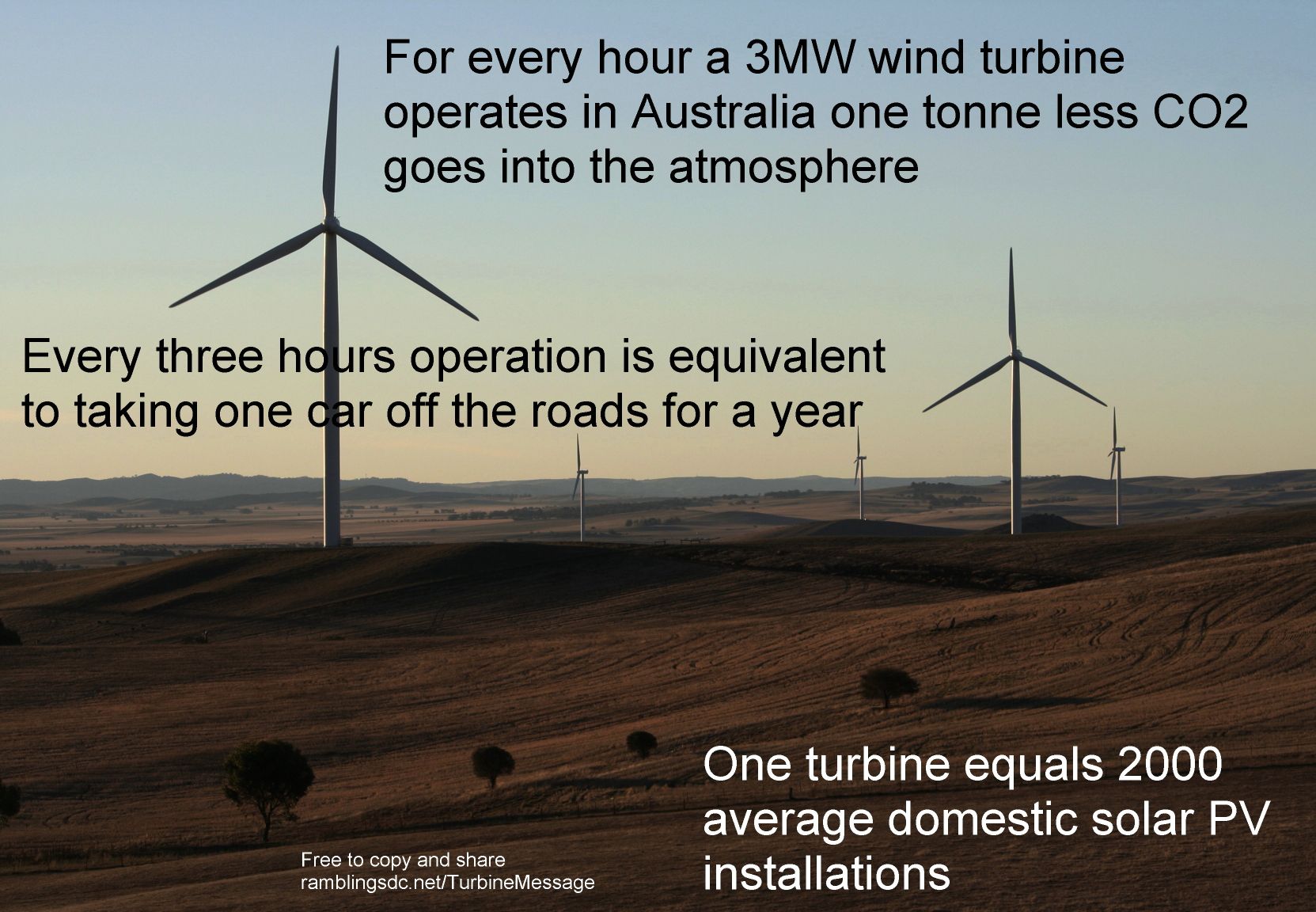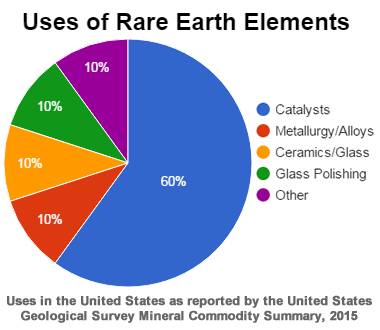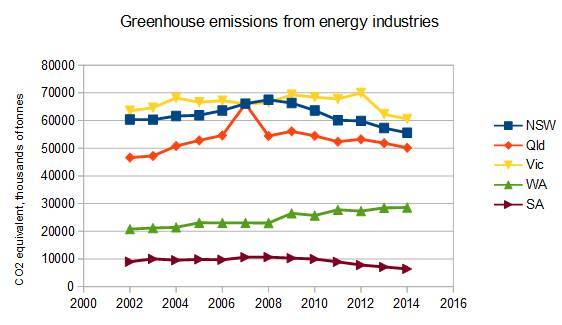The preliminary bit
| ||
| ||
|
Any argument opposing wind power that does not take into account anthropogenic climate change (ACC) and ocean acidification (OA) is not a complete and sound argument. If human society does not quickly and greatly reduce our use of fossil fuels we will be condemning our children and grandchildren to living in a greatly inferior world to the one we have been privileged to enjoy. Those who oppose wind farms almost without exception either ignore or deny ACC and OA.Lyndsey Ward's first comment:
Wind farms displace fossil-fuelled generation, as shown by the recent closing of South Australia's last coal-fired power station. As it happened, SA's wind farms generated more than enough power to satisfy the state's demand for more than 10 hours last Sunday. Of course, when the wind and sunshine is not supplying all our electricity needs gas-fired generators and the interstate interconnectors fill the gap.
In the future pumped-hydro energy storage may make some of that gas burning unnecessary.
Wind energy hits 100% of South Australia demand on Sunday
No Batteries required: pumped hydro for solar energy storage
Probably the most deluded post I have read from you yet!My response
Keep rambling – it is making anti wind campaigning even more enjoyable and amusing and heaven knows we all need a laugh!
Readers please note. Lyndsey Ward has provided us with a classic and typical comment from an opponent of wind power. Totally unspecific, no supporting evidence, no relevance to the subject under discussion, and insulting.
Advertisement...

|
|
|
The telling bit
Lyndsey Ward's second comment
Ms Ward's comment is on the left.
I have written responses to Ms Ward's statements in the boxes on the right.
|
Have you got any readers other than anti wind people? To be honest I have got a bit fed up with trying to have a debate with you.
You callously disregard those who suffer from living near industrial
turbines because you have slept under some and didn't hear anything and you
live many KMs from any so you have no real knowledge.
|
You insult Sarah Laurie who has done nothing but try to protect innocent victims of wind. You refuse to apologise to that gracious and respected lady like other wind promoters have been forced to.
|
The fact that you are not prepared to consider the pollution involved in the manufacture and construction of wind factories and you do not think that this, and grid connection and decommissioning, has any bearing on CO2 savings claims makes me think you are not a serious debater at all.
|
You are entrenched, blinkered and probably not very bright. So I will leave you to your ramblings. It was fun while it lasted but to be honest I have wind factories to fight and your never ending promotion and parroting of wind industry propaganda has become tedious. I can go to the trade associations web pages if I want to look at that – which is, I suspect, where you get it from in the first place."
|
|
Wind power alone; energy storage
Ms Ward ignores the facts
Ms Ward on Facebook, May 2016: "Ask yourself this.
If you were on a life support machine how would you like it to be powered?"
Here she was implying, on no basis whatsoever, that if there is wind power there cannot be any other sort of power. (This is an invalid argument of a type known as the straw man: see The Skeptics Guide.)
I pointed out that in the real world wind could be combined with solar PV, solar thermal, biofuels, hydro and there could be energy storage.
She went on to say: "There is no viable storage and probably never will be. All research so far shows it would be massively expensive and would need fossil fuels to be built."
The fact that it would require fossil fuels to be built is, of course, quite irrelevant. I remarked that Wikipedia says that energy storage worldwide in pumped hydro alone is 127GW (that is 127,000,000,000 Watts) of power and 740TWh (that is 740,000,000,000,000Wh) of energy in storage.
Totally ignoring the evidence provided, she went on to say:
"There is no viable storage for industrial wind energy..."
Transmission lines and power substations
Many people, wind power opponents and wind power proponents, would agree that power transmission lines are ugly. They are also unavoidable in any country that has a power grid with scattered power stations – wind farms or any other sort – supplying consumers in distant cities.Electrical sub-stations, where electricity is transformed from one voltage to another, are also unavoidable; and sometimes noisy.
Ms Ward likes to blame wind farms for transmission lines and ignore the fact that if the wind farm was replaced with any other sort of power station a transmission line would still be needed.
|
|
Reducing emissions
|
|
Her response:
"Wrong. We have to keep conventional generation ticking over in readiness to take over. It is not as efficient when used that way. In addition wind farms, especially in Scotland, are built in very remote locations and need many miles of grid connection that are not included in emissions savings calculations."(She gave no evidence to support her claim about the grid connections in Scotland and the claimed lack of consideration in emissions calculations. In Australia wind farms have only been built when there is a nearby high-capacity transmission line.)
The claim that backup power requirements negate the emission saving of wind power is a fallacy that has been commonly used among those who are opposed to wind power, it was never convincing. No matter what type of power generation there may be on a power grid, there must always be a fall-back available; all generators, including coal-fired and nuclear, fail from time to time.
For example, there has been no increase in backup power in South Australia following the installation of substantial wind power in the years between 2003 and 2016.
Strong evidence that wind power does reduce emissions is given by the graph on the upper right that shows that emissions fell in SA by 29% since 2002. There were no wind farms in SA in 2002, by 2014 South Australian wind farms were generating about 37% of the state's power. The best emissions reduction performance from any other state was a decline of 8% from NSW.
The graph also shows a significant decline in Victorian emissions starting in 2012. This coincides with a doubling (from 514 to 1066 MW installed) of wind power in that state. The percentage of wind power in Victoria is much smaller than that in SA.
550 MW of installed wind power in Australia can be expected to reduce emissions by around 1.5 million tonnes per annum so it is not enough to explain the full drop in Victoria's emissions, but it would have been a contributing factor.

